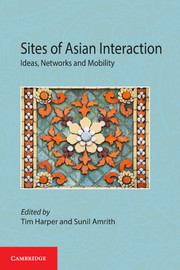Book contents
- Frontmatter
- Contents
- List of figures
- Preface
- Introduction
- 1 Singapore, 1915, and the Birth of the Asian Underground
- 2 Living in the Material World: Cosmopolitanism and Trade in Early Twentieth Century Ladakh
- 3 Nation, Race, and Language: Discussing Transnational Identities in Colonial Singapore, circa 1930
- 4 Intimate Interactions: Eurasian Family Histories in Colonial Penang
- 5 Citing as a Site: Translation and Circulation in Muslim South and Southeast Asia
- 6 Popular Sites of Prayer, Transoceanic Migration, and Cultural Diversity: Exploring the significance of keramat in Southeast Asia
- 7 Connecting People: A Central Asian Sufi network in turn-of-the-century Istanbul
- 8 ‘Enough of the Great Napoleons!’ Raja Mahendra Pratap's Pan-Asian Projects (1929–1939)
- 9 Chinatowns and Borderlands: Inter-Asian Encounters in the Diaspora
- 10 Creating Spaces for Asian Interaction through the Anti-Globalisation Campaigns in the Region
- Contributors
- Index
10 - Creating Spaces for Asian Interaction through the Anti-Globalisation Campaigns in the Region
Published online by Cambridge University Press: 05 July 2014
- Frontmatter
- Contents
- List of figures
- Preface
- Introduction
- 1 Singapore, 1915, and the Birth of the Asian Underground
- 2 Living in the Material World: Cosmopolitanism and Trade in Early Twentieth Century Ladakh
- 3 Nation, Race, and Language: Discussing Transnational Identities in Colonial Singapore, circa 1930
- 4 Intimate Interactions: Eurasian Family Histories in Colonial Penang
- 5 Citing as a Site: Translation and Circulation in Muslim South and Southeast Asia
- 6 Popular Sites of Prayer, Transoceanic Migration, and Cultural Diversity: Exploring the significance of keramat in Southeast Asia
- 7 Connecting People: A Central Asian Sufi network in turn-of-the-century Istanbul
- 8 ‘Enough of the Great Napoleons!’ Raja Mahendra Pratap's Pan-Asian Projects (1929–1939)
- 9 Chinatowns and Borderlands: Inter-Asian Encounters in the Diaspora
- 10 Creating Spaces for Asian Interaction through the Anti-Globalisation Campaigns in the Region
- Contributors
- Index
Summary
Introduction
Since the 1970s the anti-globalisation movement has provided a network for social movements critical of the policies of international financial institutions such as the World Bank and the International Monetary Fund. This has enabled them to link together to exchange criticisms as well as strategies on how to counteract the development programmes of these institutions. These movements initially emerged during the period of dictatorships in Asia when international financial institutions were perceived to provide the rationale for state-led, capitalist, authoritarian regimes. Despite the downfall of these dictatorships in the 1980s and 1990s, the policies of international financial institutions, which stress free enterprise, privatisation, and a market economy, prevailed. The intensification of these policies under the auspices of neo-liberalism further fuelled the anti-globalisation movement. Asia emerged as one of the important sites of interaction among those involved in these movements as international financial institution development models emerged in the newly industrialised countries, for example, Taiwan, Singapore, and South Korea in the 1970s and the new Asian Tigers of Thailand, Malaysia, and Indonesia in the 1980s. The 1997 Asian financial crisis, which witnessed the collapse of the economies of the newly industrialising countries and the new Asian Tigers, gave further impetus to the anti-globalisation movements as they criticised the development policies and programmes of these institutions. The crisis led to a further criticism of the international financial institutions: the absence of good governance, that is, their lack of transparency and accountability.
- Type
- Chapter
- Information
- Sites of Asian InteractionIdeas, Networks and Mobility, pp. 216 - 242Publisher: Cambridge University PressPrint publication year: 2014



